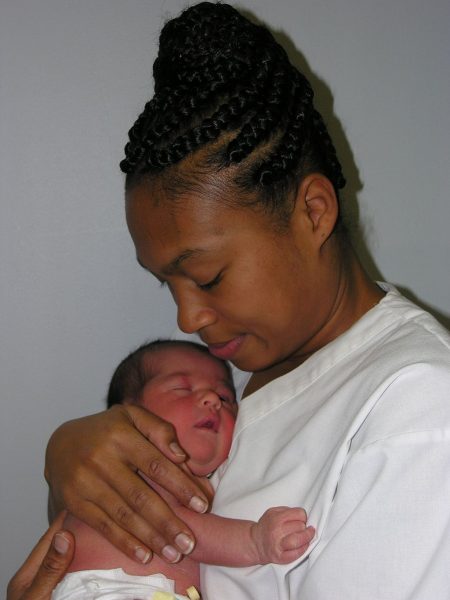“When the medical profession systematically denies the existence of black women’s pain, underdiagnoses our pain, refuses to alleviate or treat our pain, healthcare marks us as incompetent bureaucratic subjects. Then it serves us accordingly.”
So writes sociologist Tressie McMillan Cottom, reflecting on her experiences of medical neglect during pregnancy that ultimately led to the loss of her child. Thick, Cottom’s recently published collection of essays, brings to life intimate portraits and sociological analyses of black women’s issues. It has been widely acclaimed by the Chicago Tribune, The New York Times, NPR, The Daily Show, and has set Black Twitter and Academic Twitter abuzz. With Black women’s health in the spotlight, it’s helpful to reflect on what sociologists already know about medicine and wellness at the intersections of race and gender.
In the United States, racial disparities in health are severe. Black mortality is higher than white mortality, and nationally, there has been no sustained decrease in black-white inequalities in mortality or life expectancy at birth since 1945.
- Robert S. Levine, James E. Foster, Robert E. Fullilove, Mindy T. Fullilove, Nathaniel C. Briggs, Pamela C. Hull, Baqar A. Husaini, and Charles H. Hennekens. 2001. “Black-White Inequalities in Mortality and Life Expectancy, 1933–1999: Implications for Healthy People 2010.” Public Health Reports 116(5): 474–483.
Racism is itself a public health concern. Those who experience racism are more likely to suffer from chronic conditions and disability and to rate their physical health as poor. Racism is linked to poorer mental health as well, with conditions like depression and anxiety more common among those experiencing discrimination. This is particularly problematic for members of racial-ethnic minority groups who have mental health problems as they are likely to suffer discrimination effects on the basis of both characteristics. As discrimination may lead to poverty and social isolation, it can negatively impact help seeking, service use and treatment outcomes. Yet these adverse consequences are thoroughly preventable. In order to identify, anticipate, prevent, manage, and remedy such adverse outcomes, it is important for health service providers to understand racism as an ethical issue. By framing racism as the cause of preventable harmful consequences, many hope to reframe racism as an ethical issue for health service providers to address.
- David R. Williams, Harold W. Neighbors, and James S. Jackson. 2003. “Racial/ethnic Discrimination and Health: Findings from Community Studies.” American Journal of Public Health 93(2): 200-208.
- Gilbert C. Gee and Chandra L. Ford. 2011. “Structural Racism and Health Inequities: Old Issues, New Directions.” Du Bois Review 8(1): 115-132.
- Chandra L. Ford and Collins O. Airhihenbuwa. 2010. “Critical Race Theory, Race Equity, and Public Health: Toward Antiracism Praxis.” American Journal of Public Health 100(S1): S30-S35.
- Troy Duster. 2007. “Medicalisation of Race.” The Lancet 369(9562): 702-704.
- Johnstone, Megan-Jane and Olga Kanitsaki. 2010. “The Neglect of Racism as an Ethical Issue in Health Care.” Journal of Immigrant and Minority Health 12(4): 489-495.
Black Americans tend to experience poorer health outcomes than whites when factors such as age and socioeconomic status are taken into account, but the race gap is even wider among women. For example, according to the Centers for Disease Control, black women are more than three times as likely to die while pregnant or within a year of pregnancy due to causes related to pregnancy or its management. The shockingly high maternal mortality rate for black women is the primary reason that the overall U.S. rate has risen by 250% in the past quarter century.
- Utibe R. Essien, Rose L. Molina, and Karen E. Lasser. 2018. “Strengthening the Postpartum Transition of Care to Address Racial Disparities in Maternal Health.” Journal of the National Medical Association.
- David H. Chae, Sean Clouston, Connor D. Martz, Mark L. Hatzenbuehler, Hannah LF Cooper, Rodman Turpin, Seth Stephens-Davidowitz, and Michael R. Kramer. 2018. “Area Racism and Birth Outcomes among Blacks in the United States.” Social Science & Medicine 199: 49-55.
- Khiara Bridges. 2011. Reproducing Race: An Ethnography of Pregnancy as a Site of Racialization. University of California Press.
Race, class, and gender are interlocking systems of oppression that help explain maternal health inequalities. While other groups may experience some of these dimensions of oppression — for instance white women are penalized by their gender, but privileged because of their race — black women experience oppression on all three of these dimensions.
- Patricia Hill Collins. 1990. “Black Feminist Thought in the Matrix of Domination.” Pp. 221-238 in Black Feminist Thought: Knowledge, Consciousness, and the Politics of Empowerment. Routledge.
- Sara Arber. 2018. “Opening the ‘Black Box’: Inequalities in Women’s Health.” Pp. 37-56 in New Directions in the Sociology of Higher Education. Routledge.
- Tina K. Sacks. 2018. “Performing Black Womanhood: A Qualitative Study of Stereotypes and the Healthcare Encounter.” Critical Public Health 28(1): 59-69.


Comments